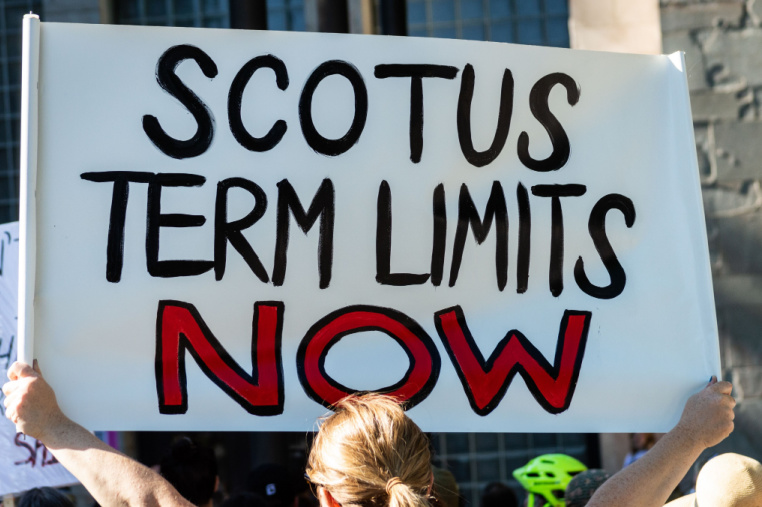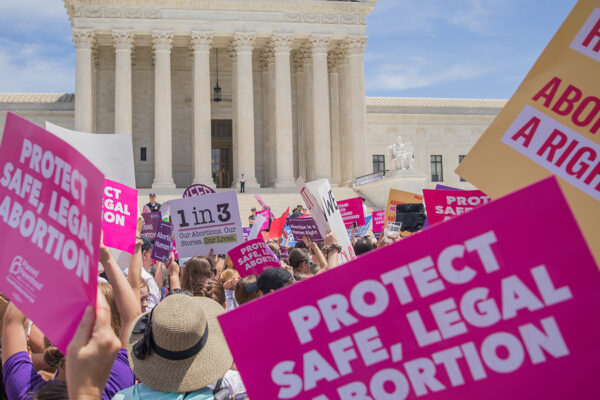The U.S. Supreme Court’s controversial Dobbs ruling, which overturned Roe v. Wade and abrogated previously declared rights, was widely seen as a momentous win for conservatives. But new research from Washington University in St. Louis shows — putting the politics of the decision aside — the ruling was an enormous loss for the court itself, producing a sizable — perhaps an unprecedented — dent in public support for the institution.
As a result, the court’s legitimacy may be at greater risk today than at any time since President Franklin Delano Roosevelt’s 1930s attack on the institution, said James L. Gibson, the Sidney W. Souers Professor of Government in Arts & Sciences and an expert on judicial politics.
The finding comes from research that Gibson conducted in July, with support from the university’s Weidenbaum Center on the Economy, Government and Public Policy and outlined in a new paper: “Losing Legitimacy: Has Dobbs Undermined Popular Support for the U.S Supreme Court?”
No stranger to controversy
The Supreme Court is no stranger to controversy, of course. Cases such as the Bush v. Gore decision, which ultimately determined the outcome of the 2000 election, and the California v. Texas case, which upheld the Affordable Care Act, were extremely controversial at the time. However, these decisions did not undermine public support for the court, Gibson said.

“When Americans are exposed to images of the justices in their robes, the majestic court building, and the visible deference typically given to the institution, they tend to view the court as removed from ordinary politics, making even unwanted rulings acceptable,” Gibson said. “For most Americans, adverse Supreme Court rulings have little if any impact on institutional legitimacy because those decisions arrive enveloped in the symbols of judicial authority.”
Results from the survey confirm the court’s Dobbs decision was widely unpopular with Americans with 62% disapproving of it while 38% supported it. Despite the ruling’s unpopularity, though, it should not have impacted the public’s overall satisfaction with the institution, Gibson said. But that’s not what happened this time.
Following the Dobbs ruling, the percent of respondents who supported the idea of doing away with the court altogether grew 7 percentage points to 19%. The percent of respondents who gave uncertain responses also grew significantly (33%). Perhaps even more ominous, 46% of the July respondents gave not a single pro-legitimacy reply to Gibson’s questions about doing away with the court; removing judges who rule against the majority; and making the court less independent. This, Gibson reported, is a stunning figure, one deviating quite a bit from past surveys.
“The most important conclusion from these data is that support for the court has undoubtedly declined,” Gibson said.
What’s different this time?
Public satisfaction with the court’s rulings has been waning in recent years. For many, the Dobbs decision seemed to be the proverbial straw that broke the camel’s back, Gibson said.
“Prior to 2020 — believe it or not — liberals won nearly half of the time (and lost half of the time),” Gibson said. “Under that scenario, nearly everyone had a reason to stay loyal to the court.
“Since 2020, however, a determined and emboldened majority on the court wants nothing but conservative decisions. If liberals rarely get what they want from the court, then the question arises of whether it makes sense to continue to support the institution. Losing, by itself, is not the problem. Sustained losing is.”
There are many other reasons why the ruling rescinding abortion rights had such a significant impact on the public’s perception of the court, Gibson explained.
“First, media coverage of the ruling was extensive, meaning that virtually all Americans were aware of the decision — and this even before the decision was made due to an unprecedented breach in the secrecy of the court’s decision-making process,” Gibson said.
Furthermore: “The decision addressed a profound moral issue on which compromise is difficult. And it ran counter to the preferences of most Americans, rescinding a constitutional right that had been available for almost a half of a century, a right with disproportionate implications for minorities.”
There’s also the issue of how the ruling was perceived from the outside.
“The case was decided by a divided vote, with a strong and caustic dissent, and it rejected a well-established precedent and challenged the theory of stare decisis,” Gibson said. “The majority opinion seemed to follow an outline written decades before by the author of the ruling on a strategy for overturning Roe, and the votes of some justices in the majority seem to be at odds with what they promised at the time of their confirmations to a seat on the court.” All these factors, Gibson opined, added fuel to the fire among those displeased with the ruling.
Court could restore public confidence, but seems unlikely to try
In the same survey, Gibson explored the question of “what’s next” with questions about the likely consequences of future court rulings on abortion and privacy. Those opposing the court’s Dobbs decision were asked whether the court should be “done away with” should a new decision come down outlawing abortion in all circumstances. Almost two-thirds (64%) of Dobbs opponents supported jettisoning the court. By comparison, only 28% of Dobbs supporters would favor doing away with the court should it reverse the decision and restore abortion rights, Gibson said. This evidence shows the court a pathway to restoration of its legitimacy.
As it stands right now, Gibson’s data show that “support for structural change in the Supreme Court — such as term limits or changing the size of the court — is already widespread and seems likely to continue to increase, especially if the court continues to take extreme positions on cases,” Gibson said.
“But I also believe that the court’s ability to get compliance with its decisions will be at risk. There are a myriad of ways people can avoid complying, with easy example being defiance of the court’s rulings through prayer in schools and Friday football games, same-sex issues. With the mass public no longer convinced that Supreme Court decisions ought to be obeyed, the rule of law get weakened and compromised, and elites are empowered to develop schemes to subvert both the law and the institution. And liberals will try to develop these schemes just as much as conservatives.”
“The Supreme Court has neither the ‘power of the purse nor of the sword,’ making voluntary compliance with its decisions absolutely essential,” he added.
‘Legitimacy is fragile; difficult to acquire, easy to lose. I still believe that legitimacy is very much like interpersonal loyalty. I will not abandon a friend who disappoints me one or two times. But sustained disappointment undermines loyalty.’
James Gibson
The justices returned to work Oct. 3 and this term could be as explosive as the last one. They will hear cases involving affirmative action, voting rights and discrimination against gay couples.
Gibson urged the court to act cautiously: “The court needs to cool it. There are a number of things the court could do to arrest the decline in legitimacy — like refusing to decide highly controversial issues for a while and providing greater transparency — but the conservatives seem hell-bent on getting everything they can while they are still in power,” Gibson said.
“Legitimacy is fragile; difficult to acquire, easy to lose. I still believe that legitimacy is very much like interpersonal loyalty. I will not abandon a friend who disappoints me one or two times. But sustained disappointment undermines loyalty,” Gibson said. The problem of sustained disappointment, especially on issues with strong moral content, will continue to bedevil the justices.
According to Gibson, only Roberts appears to be aware of the perils that lie ahead. Other justices are acting more recklessly, he said, as in Justice Clarence Thomas’ concurrence in Dobbs.
“Perhaps they were emboldened by the total failure of the Biden Supreme Court commission, but if I were one of them, I would be running scared at the moment,” Gibson said. “They can do lasting damage to the institution, quite apart from any given legal issue. And that damage could be long-lasting.”



